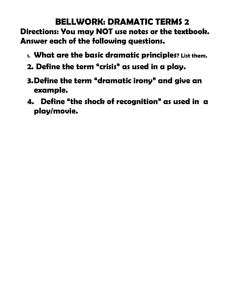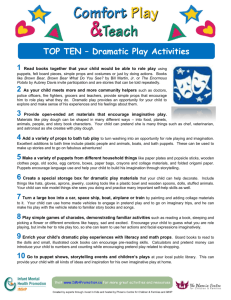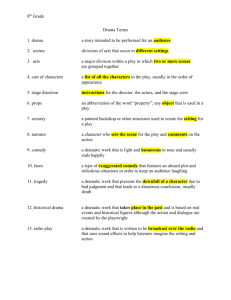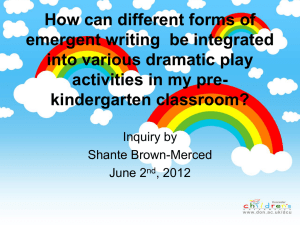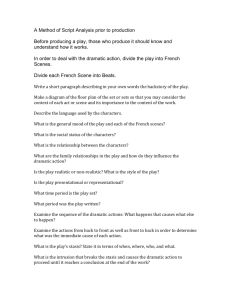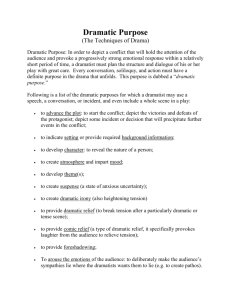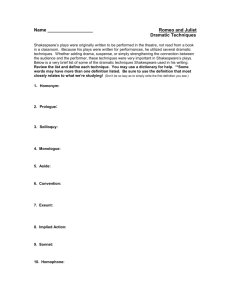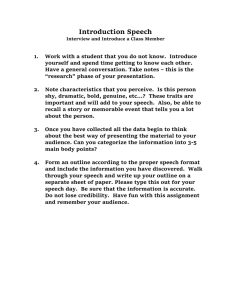DRAMATIC PLAY
advertisement
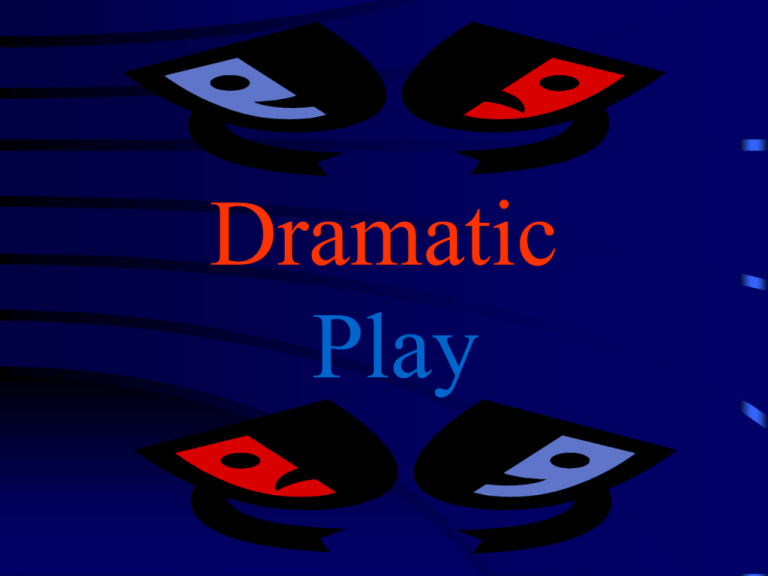
Dramatic Play DRAMATIC PLAY IMITATE REAL-LIFE SITUATIONS Think of it as a stage where the child enters and immediately takes on a role and pretends. - parenting, cooking, doctor, teacher, grocery store, office, hair salon, etc. Dramatic Play / Free Play: • Large motor activities of their choosing. – Acts on own imagination. • Best when restrictions are few. – Computers, blocks, balance beam, climbing tube, basket ball hoop, dress ups, puzzles, play dough, doll house or barn. IDEAS FOR FREE PLAY: • • • • • • • • Balls Basket ball hoop Jungle gym Teeter Totter Trucks Blocks Balance beam Crawling Tube How did you get there? • Have children stand in a line with one leader (adult) and the other adult leader stands across the yard or room. • The leader without children yells : “___, _____, how did you get there?” (filling in the blanks with an animal or a mode of transportation) • The other adult leader yells the mode of movement for that animal or vehicle. ex. "Snake, snake, how did you get there?" "We slithered!" • At this point all the children pretend to be that thing and slither to the other leader. It goes back and forth as long as the attention of your children. • Use horses, bees, motorcycles, racecars, airplanes, etc. BENEFITS of Dramatic Play All 5 areas of Growth and Development 1) Provides an outlet for the child’s inner thoughts and feelings. 2) Helps them solve personal problems and make choices. 3) Teaches about occupations. 4) Expands their minds as they act out what they can be in real life. 5) Provides practice for language development as generate plots. 6) Dramatic play creates an opportunity for children to be involved in social interactions. - Associative and Cooperative play are essential skills for social interaction in Dramatic Play. Dramatic play allows children to learn about and experience their world and the roles people play. I’m a……. (Each group come up with 1 character from their theme and write it down) • Tell the children to act as a bear and give them 10 seconds to "act" as the bear. • Blow the whistle or buzzer and create another "character" right after that, such as a clown, or police officer. • Come up with a list of "characters" and incorporate them into your lesson. Be creative and watch the responses of the children. CREATING SPACE • Separate area that can have 3 sides. – Walls, dividers, shelves, and furniture can be used. • Near other noisy areas. • Ample space to build and develop – flat and carpeted • Near block area so they can share supplies • Containing real life items. • The dramatic play area should not be limited to house play. -often it is based on the day’s theme. Be aware of Culture!! Supply pictures and props that represent different races, and types of culture. Basic Prop Box MATERIALS FURNITURE Stove - refrigerator - childsized table & chairs - mirrors - dolls - doll bed & high chair KITCHEN EQUIPMENT Pots & Pans, Utensils cooking equipment Clock telephone - food DRESS-UP CLOTHES Shoes -scarves -jewelry -hats - wigs suitcases - bags - keys BEAUTY SALON Brushes- cordless blower- empty product bottles- mirrors- apronsemery boards- magazines- play cosmetics- play money Look at basic junk items as creative opportunities! • Use toilet paper rolls to create a real life object like binoculars. • Collect a variety of old clothes. Make sure all sexes are represented. Look for accessories such as hats, ties, aprons, wigs, and shoes. Let the kids enjoy! • Take small empty clear water bottles, fill them half full with water and food coloring, then hot glue the cap on. The kids love pretending to drink these different "juices". • What CAN You do with a Cardboard Box? • What would you put in these areas……. Pilot and Planes • Create a real environment that exists in a plane i.e.: Seats, pilot hat, flight attendant cart, pretzels. • Place tape on the floor to outline the plane. Going Fishing • Outline a boat on the floor with tape. • Set chairs in the “boat”. Supplies fishing poles, worms, and fish for fishing. Winter Beach Blast • First ask parents to dig out the children's swimsuits and bring them in. Then we fill a child size pool with just enough water or sand for the kids to get a little wet then we get out beach towels, beach balls, sunglasses, sand toys and of course ice cream cones. Transportation Make Take cardboard storage boxes (the height of the boxes should be from the floor to the children's knees). • Cut out the bottoms and tops of the boxes and remove the flaps if any so that the box is hollow. • Cut handles in the longer sides for the children to hold box with their hands. • Paint the boxes to resemble a car, fire truck, boat, bus, etc. • The children can stand in the box and hold it up while moving in the dramatic play area and throughout the room. Bath Tub • Get a nice heavy cardboard box. Cut the box down to two feet in height, paint the outside white. Inside the box cover a paper drinking cup with silver glitter to be the faucet and make knobs attached with brass fasteners to represent hot and cold water. Inside the "TUB" put packaging peanuts for bubbles along with wash clothes. For fun add empty shampoo bottles, towels, bath pillows, bars of soap and shower caps. Oh ... don't forget your rubber duck FARM • Real Cow : Make a cow head and tail out of poster board. Place the head on a small chair and the tail on another small chair put a broom stick across the chair fill a rubber glove with half water and milk tie it and then tie it to the broom stick make sure you poke holes at the finger tips) show the child how to milk a cow CREATE A DRAMATIC PLAY PROP BOX • List 10 items that you can realistically put in your dramatic play area. Use your imagination! Relate your lesson plan directly to the dramatic play area! • Example: Teacher – Book, Paper, Chalk, Crayons, Ruler, Glasses, Black Construction Paper, Calculator, Markers, Notebook. – What would you put in a Royalty box and a Gardner box? • Now Choose 1 of your items and write it on a strip of paper for our next game. Suitcase game: • Put a pile of old clothes and props on the floor and put an empty cardboard box alongside them. • One person picks up an article, ie: a red hat, and puts it in the box saying, – "I'm going on vacation and I will take...my red hat." • The next person also puts something in the box, for example, a blue shirt, and says – "I'm going on vacation, and I'll take...my red hat and blue shirt." • Continue the game, increasing the list of things in the box until one person forgets something. TEACHERS ROLE IN DRAMATIC PLAY • Coaching: – Provide children with problem solving ideas – Child may not want to be a baker because there is not a baker’s hat. You help them make a paper hat – A child is hitting and you tell them to stop because the child does not like it and then direct them through solving the issue. • Modeling: – Show them appropriate ways to play a part – In a shoe store the child may not know how to sell shoes so you say," Would you like to buy some shoes today?” – Your child looks hungry, shouldn’t you go and feed him? BLOCK (Legos, Lincoln Logs..) AREA – also dramatic play • Away from quiet areas and next to noisy areas like dramatic play. • Use the shelves for walls and storage • Ample space to build without getting in the way of others. • Flat carpeted surface for warmth, comfort, and noise control • Props other than blocks: furniture, people, cars, animals, road signs….. • Establish simple rules to keep the “construction Site’ safe. – We use blocks for building – We take blocks as we need them – We clean up our blocks when we are finished Remember PUPPETS • A self conscious child can hide behind a puppet and act out feelings or be anything. – they may say things to or through a puppet that they would not say to anyone else. • The teacher can use puppets to motivate and teach the children – Often they will listen to a puppet over a teacher. PUPPETS out of ANYTHING • Use a paper plate, sock, brown paper bag, picture on a stick, mittens, toilet paper tube, finger puppets, ….. Act out a Story or a Book • Read a book like Brown bear, Brown Bear. • Create face puppets using paper plates. • Then act out the book using the paper plate masks. CREATE A PUPPET BASED ON YOUR THEME • Each person create a puppet based on the group preschool theme. • Write a puppet story (or use a well known one) – Begin with a teaching theme (friends, manners, safety, vacation, holidays, occupations, rules…) and center the story around this. – Simple, familiar problems add interest – End the story by resolving the conflict / issue. • Turn a table over for your puppet stage and get ready to perform! – Sound affects, appropriate character voices, props
